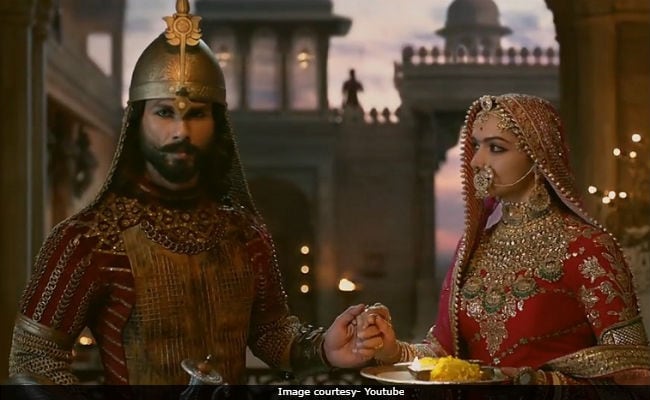
Supreme Court rejects petition against "Padmaavat", says "duty of state to protect people, not our job"
New Delhi:
A day after ruling that the film "Padmaavat" cannot be banned by states on account of potential law and order trouble, the Supreme Court today told a petitioner that protecting people "is the job of the state, not ours".
Three judges, including Chief Justice of India Dipak Misra, rejected the argument that screening the film may cause "serious threat" to life, property and law and order.
"Maintaining law and order is not our job. That is the job of the state. Prayer rejected," the judges responded.
Petitioner ML Sharma had challenged the U/A certificate granted by the censor board to the period drama, which is releasing next Friday after a nearly two-month delay over protests by Rajput groups and the decision by some states to ban the film.
Mr Sharma told the court that there would be "law and order problems in the country" and questioned, "If there are riots in the country after the release of the movie, who would be responsible?" He also referred to the documentary "India's Daughter" based on the Delhi gang-rape, which was banned in 2015 on grounds of "objectionable content".
 Chief Justice of India Dipak Misra replied: "We are functioning as a constitutional court. It is the duty of the state to protect. We have passed a detailed order yesterday and once the CBFC (Central Board of Film Certification) gives its nod, it can't be stopped."
Chief Justice of India Dipak Misra replied: "We are functioning as a constitutional court. It is the duty of the state to protect. We have passed a detailed order yesterday and once the CBFC (Central Board of Film Certification) gives its nod, it can't be stopped."
On Thursday, the top court cleared the way for the film's release by saying that it cannot be banned by states. The court said states were bound by the constitution to maintain law and order, provide police protection to those involved in the film, its screening and the audience.
"Padmaavat" is inspired by a 16th century poem on Rajput Queen Padmini, a legendary beauty who preferred to commit "Johar" or self-immolation instead of submitting to Sultan Alauddin Khilji after he killed her husband.
Rajput groups led by the Karni Sena allege denigration of the Queen and distortion of history. Earlier this year, the film was given the go-ahead by the Central Board of Film Certification or the censor board, which had asked the makers to change the title from Padmavati to Padmaavat and suggested some other modifications.
Three judges, including Chief Justice of India Dipak Misra, rejected the argument that screening the film may cause "serious threat" to life, property and law and order.
"Maintaining law and order is not our job. That is the job of the state. Prayer rejected," the judges responded.
Petitioner ML Sharma had challenged the U/A certificate granted by the censor board to the period drama, which is releasing next Friday after a nearly two-month delay over protests by Rajput groups and the decision by some states to ban the film.
Mr Sharma told the court that there would be "law and order problems in the country" and questioned, "If there are riots in the country after the release of the movie, who would be responsible?" He also referred to the documentary "India's Daughter" based on the Delhi gang-rape, which was banned in 2015 on grounds of "objectionable content".

"Padmaavat" is inspired by a 16th century poem on Rajput Queen Padmini.
On Thursday, the top court cleared the way for the film's release by saying that it cannot be banned by states. The court said states were bound by the constitution to maintain law and order, provide police protection to those involved in the film, its screening and the audience.
"Padmaavat" is inspired by a 16th century poem on Rajput Queen Padmini, a legendary beauty who preferred to commit "Johar" or self-immolation instead of submitting to Sultan Alauddin Khilji after he killed her husband.
Rajput groups led by the Karni Sena allege denigration of the Queen and distortion of history. Earlier this year, the film was given the go-ahead by the Central Board of Film Certification or the censor board, which had asked the makers to change the title from Padmavati to Padmaavat and suggested some other modifications.
Track Latest News Live on NDTV.com and get news updates from India and around the world

